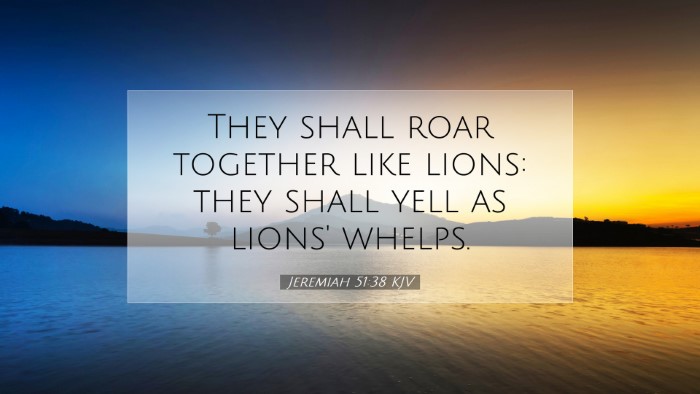Commentary on Jeremiah 51:38
Verse: “A drought is upon her waters; and they shall be dried up: for it is the land of graven images, and they are mad upon their idols.”
Contextual Overview
The book of Jeremiah serves as a prophetic exposition concerning the impending judgment on Babylon. In Jeremiah 51, the prophet articulates the divine pronouncement of destruction against the kingdom due to its idolatry and moral decay. This verse highlights the divine judgment where the natural elements align with God's will, indicating the severity of His judgment against idol worship.
Thematic Insights
- Judgment Against Idolatry: Commentators like Matthew Henry emphasize that the reference to drought signifies the withdrawal of God’s favor. In this case, Babylon, known for its deep-seated idolatry, will suffer the consequences of their rejection of the true God.
- Symbolism of Drought: Albert Barnes explains that the drought symbolizes both physical desolation and a spiritual barrenness, reflecting the consequences of relying on false gods. The drying up of waters can be seen as an imagery of the lifelessness that accompanies a society rooted in idolatry.
- The Madness of Idolatry: Adam Clarke elaborates on the phrase “mad upon their idols,” suggesting that such devotion to false gods leads to irrational behavior. The people’s worship is not just foolish but a source of moral and spiritual madness that results in societal collapse.
Commentary Analysis
Drought as Divine Judgment: In ancient contexts, water was crucial for sustenance and prosperity. Through the metaphor of drought, Jeremiah conveys that God’s judgment will lead to the stripping away of resources essential for life, highlighting God's authority over creation. This aligns with the biblical motif where natural calamities often accompany divine retribution (Henry).
The Deception of Idolatry: The mention of "graven images" warns of the futility of idol worship. Barnes notes that these images cannot save or provide, which ultimately leads the people into despair. The “madness of idols” implies a derangement that overtakes those who forsake true worship, further elaborating on the consequences of turning away from the living God.
Theological Implications
Theological reflections reveal critical insights into the nature of God’s justice and the implications of human sinfulness. Idolatry is portrayed as rebellion against God's sovereign rule, where humanity seeks fulfillment in creation rather than the Creator.
- God’s Sovereignty: This verse reminds believers that God's sovereignty extends over nations and cultures. Despite Babylon's might, the true God reveals His power through judgment, affirming that no dominion can persist in rebellion forever.
- The Call to Holiness: For believers today, this serves as a stark reminder to examine their own lives for idols. The passage encourages a pursuit of holiness and fidelity to God, who rightly commands worship and devotion.
Pastoral Applications
Pastors and leaders can draw from this passage rich implications for preaching and teaching.
- Idolatry in Contemporary Society: Just as in Jeremiah's day, the modern world is rife with idolatry, whether through materialism, secularism, or misplaced priorities. This commentary underscores the importance of addressing these issues in pastoral care and teaching.
- Encouragement to Depend on God: The drought God brings serves as a compelling narrative that encourages believers to seek dependence on Him rather than worldly systems. Pastors can utilize this to guide congregations back to God’s sufficiency.
- A Call to Repentance: As Babylon faced judgment, there exists an urging for believers today to engage in continual repentance, fostering a community that seeks God’s favor above all else.
Conclusion
Jeremiah 51:38 stands as a profound testament to God’s active role in history, calling His people to remain vigilant against idolatry and to recognize the implications of turning away from Him. This commentary encapsulates the essence of divine judgment while simultaneously issuing a call to understanding, reflection, and righteous living.


